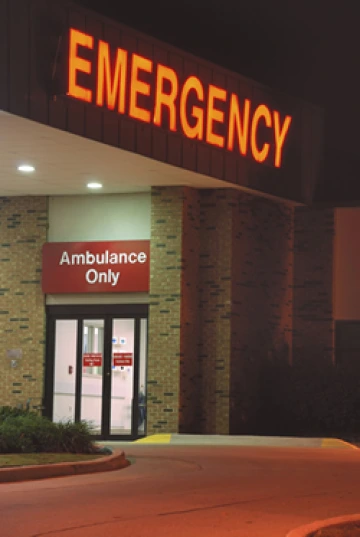Emergency Care or Urgent Care – Where to Go When You Need Treatment for the Flu?
With cold and flu season in full swing, should you head to the emergency department or an urgent care center when your symptoms become severe?

With cold and flu season in full swing, should you head to the emergency department or an urgent care center when your symptoms become severe?
Urgent care centers are designed to provide treatment quickly to patients with less serious conditions when their primary care physician is unavailable. Most are equipped to handle non-life threatening situations and provide services that you typically can find at your doctor’s office.
Emergency departments (ED) treat patients with potentially life-threatening conditions. They have the widest range of services for emergency care, including diagnostic tests, equipment and access to specialists.
Influenza is a miserable condition that often requires no urgent medical treatment. Most cases of influenza, and nearly all cases of other viral upper-respiratory illnesses, can be treated with acetaminophen, ibuprofen and adequate hydration.
Antibiotics do not work on viruses, and Tamiflu is only effective for influenza if started within 48 hours of illness, and even then only shortens the course of the illness (7-10 days) by one day. Children with a fever should stay home from school and social activities until they have been without a fever for 24 hours without acetaminophen or ibuprofen to avoid spreading this disease.
Unless the flu appears life-threatening, it is always a good idea to call your primary care physician first to check availability. If you need to be treated right away, urgent care centers are fine options for most minor influenza-type symptoms, but they are not an alternative for emergency care.
According to a poll by the American College of Emergency Physicians, 71 percent of emergency medicine physicians reported they treat patients every day who come to the ED after first seeking help in urgent care centers that were not equipped to care for them. Ninety percent of emergency medicine physicians said one of the top reasons patients are redirected to emergency departments is because the patients' medical conditions were more serious than could be treated in an urgent care setting. In instances of serious illness, that loss of time can be dangerous.
If you or your child is exhibiting warning signs of flu-related distress, or are part of a high-risk group and need immediate medical care, call your primary care physician. If he or she is unavailable, the following are some guidelines on when to choose emergency care or urgent care:

- Anyone with a moderately complex medical history, especially premature infants or those who were required to stay in the hospital for more than a day after birth, should come to the ED.
- Anyone who has not had routine preventative medical care, including unvaccinated children, should go to the ED.
- Young children (under 6 months) with a fever and anyone with difficulty breathing should go to the ED.<
- Anyone visiting or who has recently traveled outside the United States, should go to the ED.
- Children who already have been seen once by a practitioner and are not improving should go to the ED.<
- Children or anyone the parent or caregiver is concerned about, who are lethargic, agitated, vomiting, appear dehydrated or who don't respond to antipyretics (such as ibuprofen or acetaminophen), should go to the ED.
- Runny noses without fever, cough or difficulty breathing in healthy adults and children over 6 months old who are staying hydrated and have no past medical history except routine medical care, can go to an urgent care center or their primary care physician.
One further note: both emergency departments and urgent care centers can diagnose the influenza virus. However, most urgent care centers use a type of flu test called the ELISA (enzyme-linked immunosorbent assay). This can lead to over diagnosis of influenza and over treatment. At Banner – University Medical Center Tucson, we have a PCR (polymerase chain reaction) test for influenza that is more than 99 percent accurate, making the diagnosis less of an issue.
All children and any adults caring for children should get their flu vaccine. It's not too late, and this IS something most urgent care centers are equipped to provide.
About the Author
Katherine Hiller, MD, MPH, FACEP, is an associate professor and director of medical student education at the University of Arizona Department of Emergency Medicine, UArizona College of Medicine – Tucson and see patients at Banner - University Medical Center Tucson's emergency department.
Dr. Hiller is a near-native of Tucson and has been at the University of Arizona since 2004. She has been the Course Director for the Department of Emergency Medicine fourth-year rotation since 2005. She is active in medical student education both within the University of Arizona and nationally with the Clerkship Directors in Emergency Medicine. Dr. Hiller's academic interests include increasing medical student exposure to emergency medicine throughout the curriculum; the integration of critical care in the emergency medicine curriculum; testing and evaluation; and faculty development of medical student educators.

